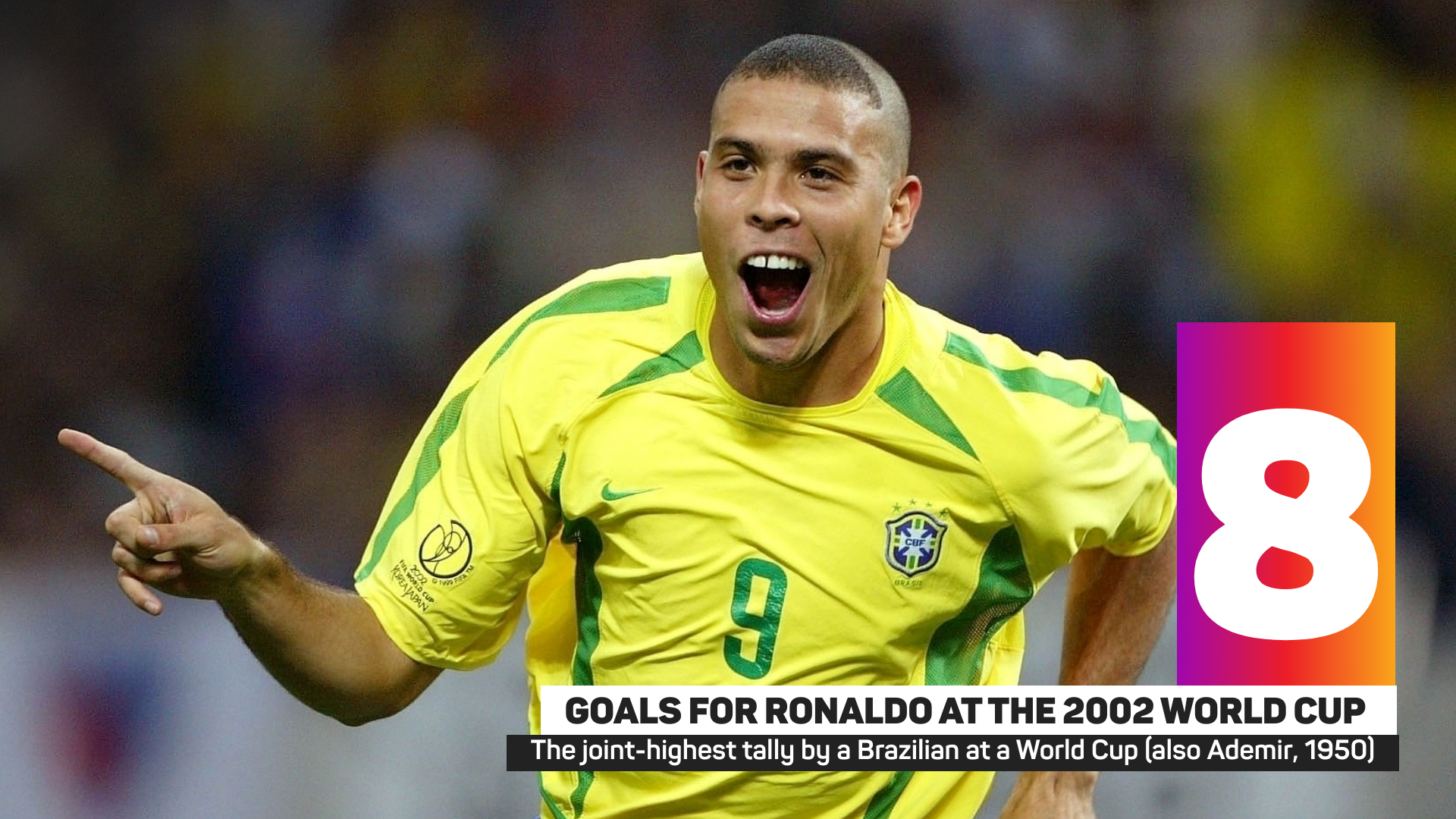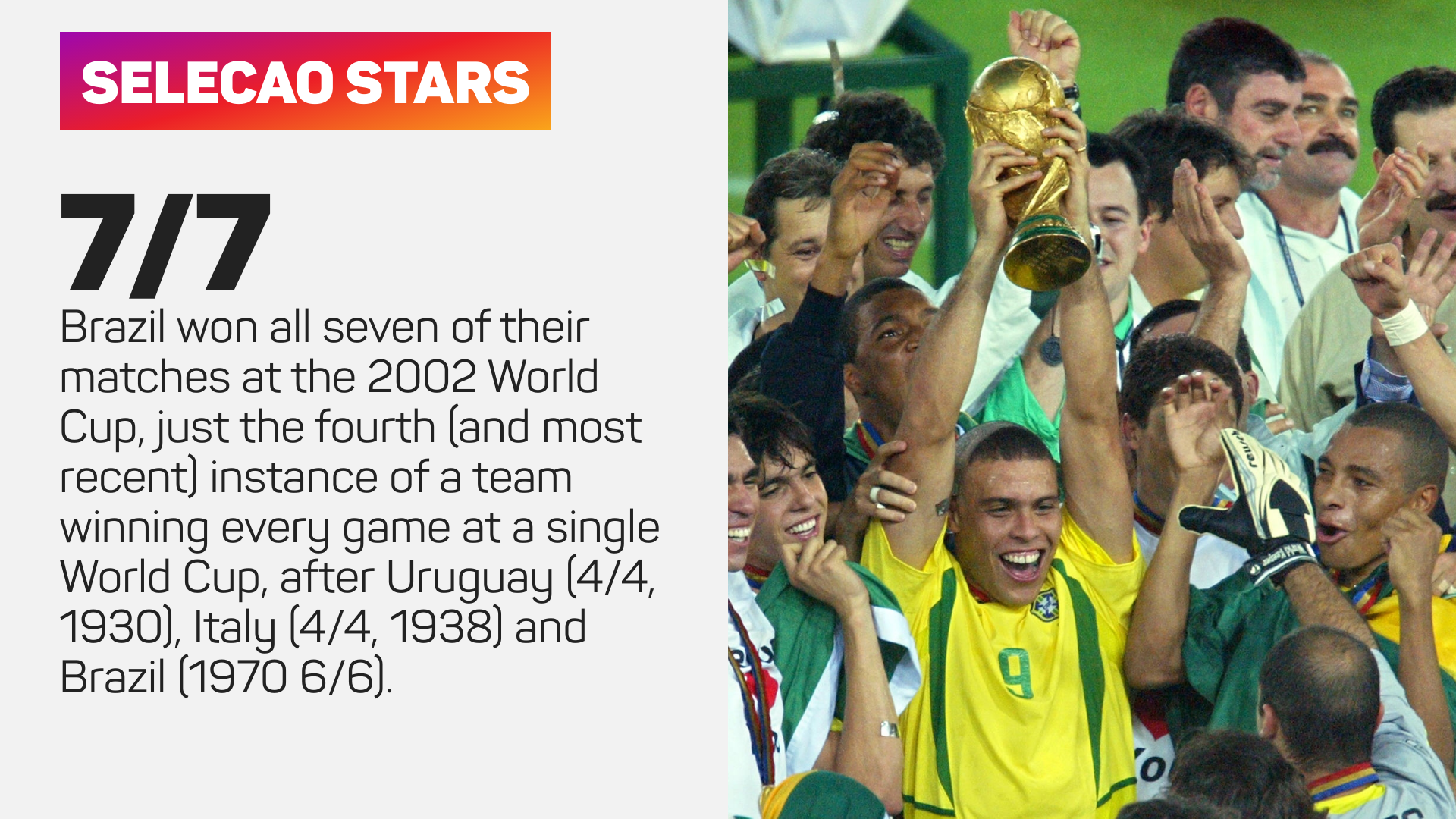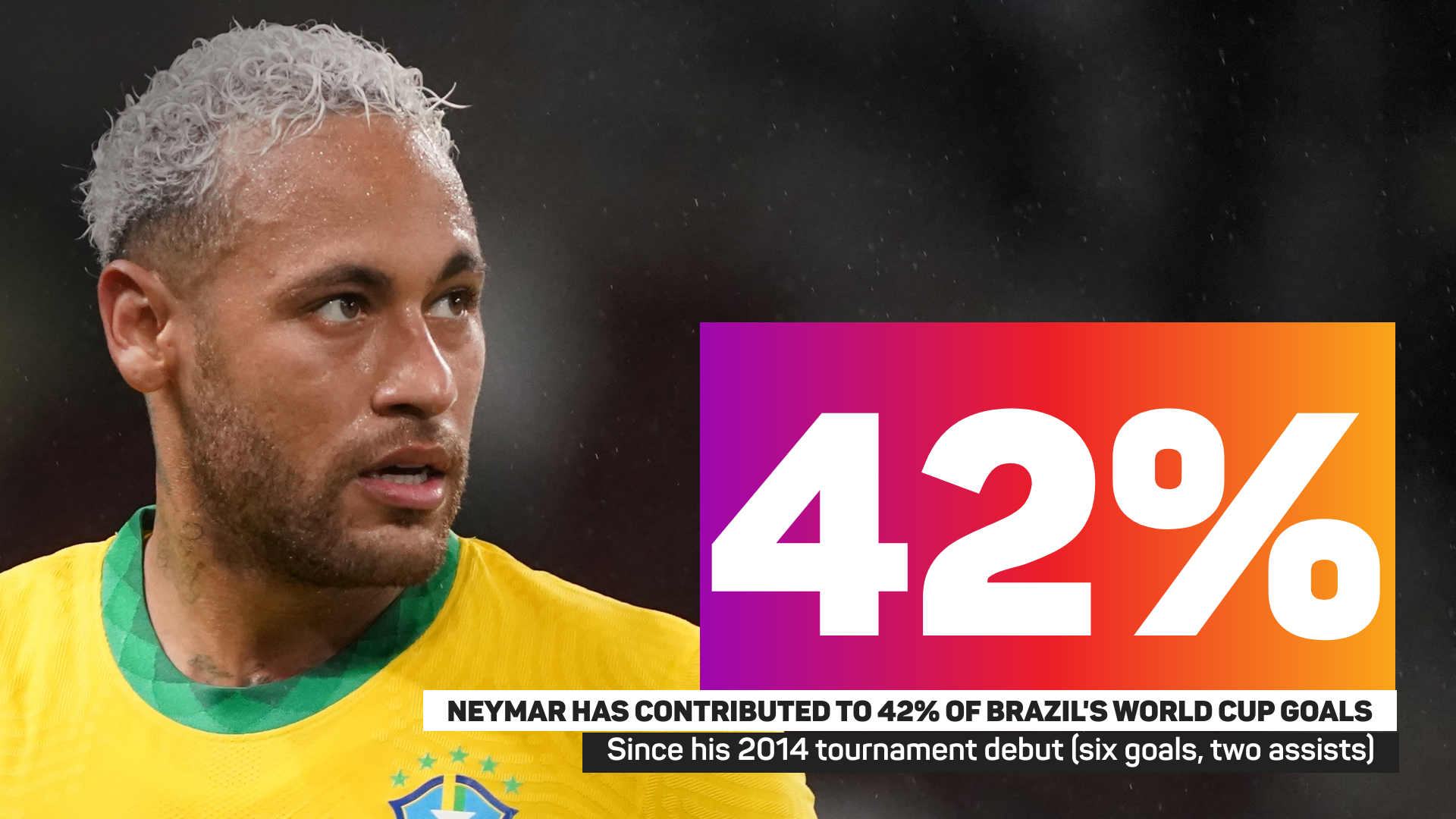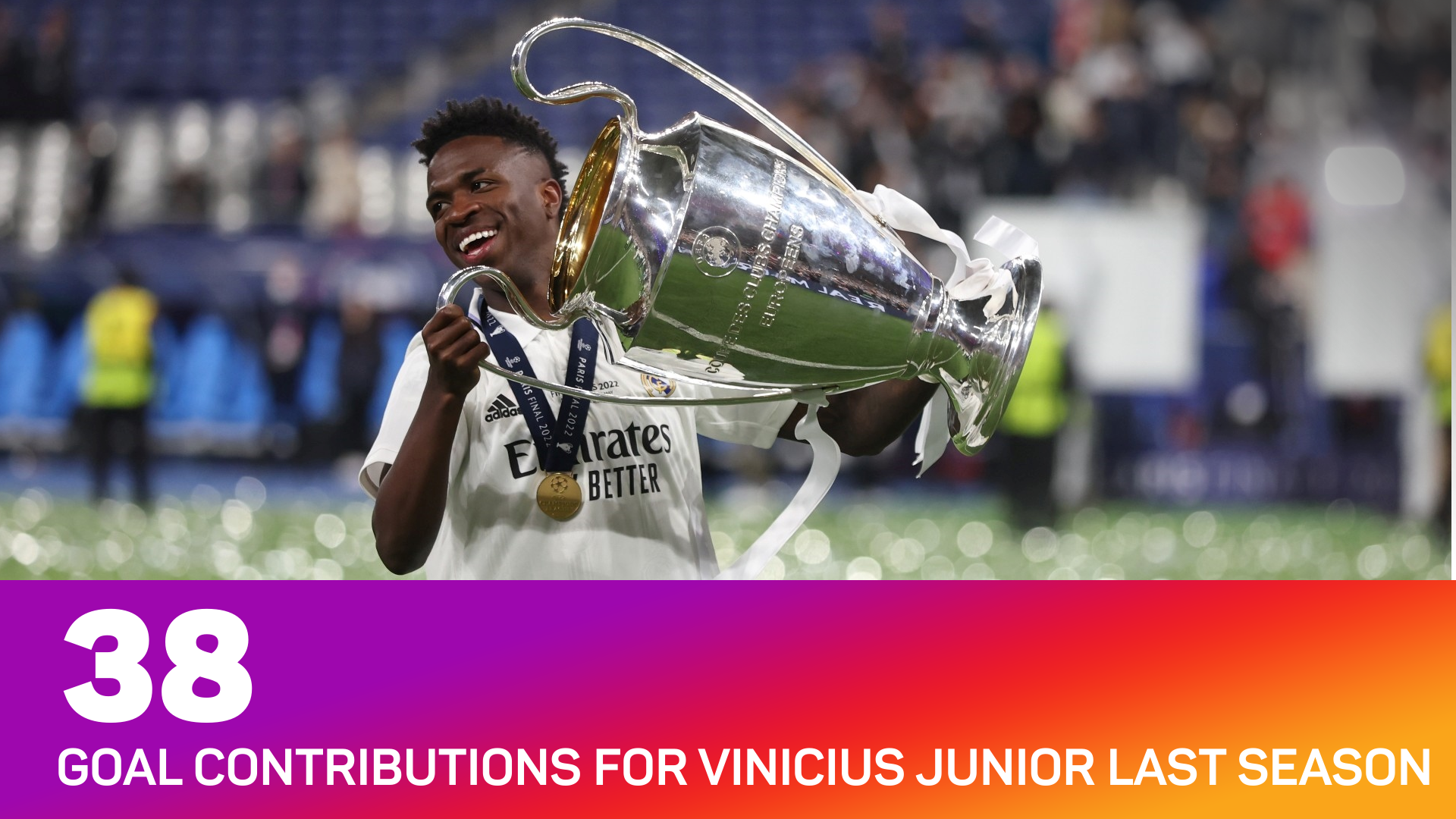June 30, 2002, Yokohama. Ronaldo pounces on Rivaldo's dummy to side-foot past Germany's Oliver Kahn, becoming just the ninth man to score twice in a World Cup final and making Brazil champions of the world.
That moment, the pinnacle of the legendary forward's career, remains unmatched to this day for the Selecao, with Brazil failing to add to their five World Cup crowns in the subsequent two decades.
Advertisement
Should Brazil fall short of glory in Qatar later this year, that drought will stretch to at least 24 years, matching their longest wait for World Cup glory since their maiden title in 1958 (also between 1970 and 1994).
For a country whose hopes have been entrusted to such footballing icons as Ronaldinho, Kaka and Neymar in subsequent years, such a drought seems inexplicable, with three quarter-final exits and one historic semi-final humiliation the sum of their efforts since 2002.
Exactly 20 years on from Brazil's triumph in Japan and South Korea, Stats Perform looks back on that momentous success, questions why it is yet to be repeated, and asks whether Tite's class of 2022 are equipped to bring glory to one of the world's most football-mad nations.
2002: Irresistible Ronaldo fires Selecao to glory in Japan and South Korea
It is no exaggeration to say Brazil's last World Cup win was one of the most impressive triumphs in the competition's history.
Luiz Felipe Scolari's men went from strength to strength after requiring a late Rivaldo penalty to edge a tense opener against eventual third-placed finishers Turkey, winning all seven of their games by an aggregate score of 18-4.
The class of 2002 thus hold the record for the most games won by a nation at a single World Cup, with Ronaldo – coming off an injury-blighted four seasons at Inter in which he managed just 36 Serie A appearances – the star of the show.
Partnering Rivaldo and supplied by Paris Saint-Germain's breakout star Ronaldinho, O Fenomeno netted eight goals across the tournament, the joint-most of any Brazilian at a single World Cup and the highest tally of anyone since West Germany's Gerd Muller struck 10 times in 1970.

Ronaldo's 19 shots on target in the tournament has not been matched in any subsequent World Cup, while his total of 34 attempts was more than five different nations managed.
Quarter-final opponents England, vanquished when Ronaldinho audaciously (perhaps fortuitously) lobbed David Seaman from long-range, were the only side to keep Ronaldo out as he took the competition by storm.
A 25-year-old Ronaldo's final double against Germany represented his 44th and 45th international goals in just his 64th Brazil appearance. He managed just 17 further strikes in the famous yellow shirt during his career.
There was nothing in the 2002 squad's make-up to suggest a long wait for further tournament success was imminent: The experienced Cafu (31 in 2002) and Roberto Carlos (29) were still around in 2006, while future Ballon d'Or winners Ronaldinho (22) and Kaka (20) had their whole careers ahead of them.
How, then, did one of the greatest sides in modern international history contrive to fall so far short in subsequent World Cups?

2006-2010: Zidane and Sneijder sparkle as drab Brazil fall short
Brazil looked set for another shot at glory in Germany in 2006. Ronaldinho was crowned the world's best player in 2005; Kaka was to follow in his footsteps in 2007; and Ronaldo had hit a century of goals in his first four seasons with Real Madrid.
Brazil conceded just once in group-stage clashes with Croatia, Australia and Japan before crushing Ghana 3-0 in the last 16, but with Carlos Alberto Parreira cramming his three attacking stars into a rigid 4-4-2 shape, it was France who more closely resembled the Brazil sides of old in the last eight.
Zinedine Zidane's performance in Frankfurt stands as one of the finest in the competition's history, as he tormented the defending champions' flat midfield before assisting Thierry Henry's winner.
It was the first of two masterful midfield displays to end the World Cup hopes of drab Brazil teams, with Wesley Sneijder assuming Zidane's role as the Netherlands vanquished Dunga's men in South Africa in 2010.
Progressing from the group stages has not been an issue for Brazil. Astonishingly, they are unbeaten in their last 15 group games, last suffering a first-stage defeat against Norway in 1998.
A lack of tactical nous against the world's best, however, has been a legitimate charge, and an understandable one given the identities of some of their head coaches.
Parreira's one Brazilian top-flight title was won way back in 1984, while Dunga's only club-level experience remains, to this day, a dire 2013 campaign with Internacional.
In that context, the return of Scolari, the emergence of Neymar and a home World Cup lifted expectations to monumental levels by 2014, when Brazilian dreams were to be shattered in the most incredible manner imaginable.
2014-2018: Home humiliation and Neymar reliance see Brazilian woes continue
The 2014 World Cup was billed as a festival of football, lit up by jubilant Brazilian crowds and thrilling football – the 171 goals scored across the tournament are the joint-most on record, alongside 1998.
Sadly for Brazil, eventual winners Germany provided 18 of those, with seven coming in a scarcely believable semi-final rout at the Mineirao.
Having gone 5-0 down within 29 minutes in the absence of Neymar and Thiago Silva, Scolari's men collapsed to arguably the greatest humiliation in World Cup history and, as almost goes without saying, the heaviest semi-final defeat the tournament has ever seen.
Only when Yugoslavia faced Zaire in 1974 had a side previously been 5-0 up after 29 minutes at a World Cup, but for all the excitement building around the host nation, Brazil's class of 2014 always appeared flawed.
An over-reliance on Neymar – cruelly sidelined by a dreadful quarter-final challenge from Colombia's Juan Camilo Zuniga – was clear in both 2014 and 2018, when Brazil fell to a 2-1 defeat to a Kevin De Bruyne-inspired Belgium in Russia.

Across those two tournaments, Neymar's six goals and two assists saw him directly involved in 42 per cent of Brazil's goals.
Fluminense striker Fred, ridiculed by many for his performances in 2014, wasn't exactly up to the task of replacing his goal threat, while Gabriel Jesus failed to find the net despite starting every match under Tite in 2018.
Indeed, coming into the 2018 tournament, Neymar – with 55 goals in 85 caps, was the only player in the Brazil squad to have scored more than 12 international goals.
Having achieved the rare feat of holding onto his job after leading Brazil at a World Cup, Tite will hope the emergence of several other stars lessens the burden on his number 10 this time around.
The road to Qatar: Can the class of 2022 end World Cup drought?
Assuming he remains in charge when they face Serbia on November 24, Tite will become the first coach to lead Brazil at back-to-back World Cups since Tele Santana in 1982 and 1986.
While neither of Santana's campaigns ended in glory, the current boss – a Copa Libertadores and FIFA Club World Cup winner – will hope his six years moulding the side will prove invaluable in Qatar.
Brazil have already ended one mini trophy drought under his watch, winning a first Copa America title in 12 years on home soil in 2019 before finishing as runners-up to Argentina two years later.
Most impressively, Brazil triumphed without the injured Neymar in 2019 as Everton Soares top-scored, and the form of a series of Selecao stars has given Tite enviable squad depth.
In Allison and Ederson, he can choose between arguably the top two goalkeepers in the Premier League, while Fabinho was crucial as Jurgen Klopp's Liverpool fell narrowly short of a historic quadruple last term.
Casemiro, who won his fifth Champions League title with Madrid in May, could partner him in a fearsome midfield duo, but most of the excitement is centred on his club team-mate Vinicius Junior, whose 22 goals and 16 assists for Los Blancos last term suggest he can be the man to dovetail with Neymar.

After landing an appealing group-stage draw alongside Serbia, Switzerland and Cameroon, the excitement around Brazil is building once more.
With the Selecao topping the FIFA World Rankings, having fairly recent a Copa America win under their belts and possessing some of European football's most-effective players, 2022 seems as good a time as any for Brazil to end 20 years of disappointment and bring 'o Jogo Bonito' to the world once more.






